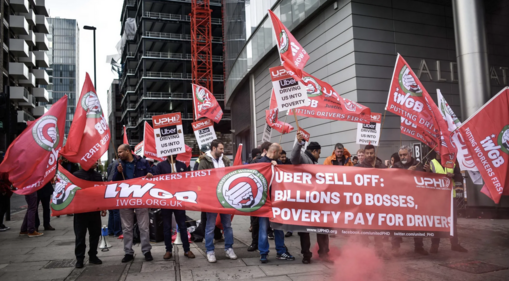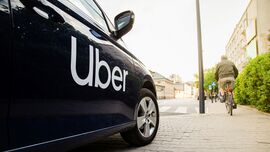Gig economy
"Why Is Everything Turning Into Uber?" by Second Thought |
"Gig economy" is a euphemism intended to legitimize a system of pseudo-employment whereby proletarians are informally contracted to perform tasks on a piecemeal basis, usually via a proprietary app controlled by the contracting company. Gig work has grown to take up an ever larger proportion of the overall employment landscape, with many fields previously worked by full employees with rights and protections now being "Uberized."[1]
The gig economy is part of a broader worrying trend in employment within modern neoliberal economies, alongside zero-hour contracts and the increasing use of temporary workers to do work that previously would be hired as a full employee with benefits and protections.
Etymology
The term gig derives from the sub-culture of semi-amateur music performances where performers are paid per show or gig. In gig economy terms, each separate task, such as a single food delivery or taxi ride, is a gig and therefore companies attempt to justify not being obliged to pay a fixed wage and benefits on the grounds that workers are paid on a per-job basis as "freelancers" and therefore are not proper "employees".[2]
Conditions
Due to the nature of the gig economy, people who work for the corporations offering this type of labor are not legally considered employees but are rather classified as "independent contractors," and therefore the de-facto employers are not required by law to comply with even the most basic labor laws like minimum wage or maximum hours.[3] The capitalists who operate the gig economy have particularly benefited from the coronavirus pandemic, with the sharp rise in income inequality forcing more workers to pursue multiple jobs at once.[4]
Labor abuses
Although many online gig platforms promise high wages, their workers struggle to receive even livable income, with a large amount of gig workers in the United States earning less than the state minimum wage and many more actually losing income from gig work, usually having to pay out-of-pocket for their own items to conduct the job as well as other expenses.[4] Further, nearly all incidents and accidents which take place among gig workers are regarded as their own issue by the operators and must be paid for by the worker alone.[5]
Despite some gig employers nominally imposing limits on the amount of hours worked, gig workers still regularly suffer from exhaustion as a result of their jobs, often having to wake up and work during the early and later hours of the day to maximize income during "rush hours." Gig workers for Uber and other corporations are offered no paid overtime whatsoever.[6]
Demographics
The majority of workers for online gig platforms are younger, usually under the age of 30 years old. Over half of gig workers under the age of 35 use online gig services as their primary source of income. Further, gig workers are very frequently from poorer economic backgrounds, usually doing gig jobs in addition to "conventional" labor.[4]
Ethnic discrimination
In the United States, a considerably highly percentage of people belonging to an ethnic minority do some form of gig work, a large amount of whom are impoverished immigrants forced into that sort of labor. These immigrants involved in gig work are offered even more abysmal working conditions, often being forced to sleep in supermarket or airport parking lots.[7][8]
Gender discrimination and sexual harassment
Over half of workers involved in some form of gig work in the United States are females. This demographic often experience sexual harassment when performing jobs yet are often unable to receive any sort of protection from the operators of the gig platform. Further, female gig workers in less developed countries such as India are especially likely to be abused and harmed when working, and experience large pay gaps relative to their male counterparts.[9]
Ideological justification
Arguments by apologists in favor of gig work are usually grounded in petite-bourgeois ideology, especially individualism. Arguments include "being your own boss," increased "workplace flexibility," "upward mobility" and the prospect of somehow entering the bourgeois class, etc.[8] Crucially, however, the technological "disruption" of existing industries, such as food delivery and taxi services, also creates a type of technological fetishism which artificially separates the new workers from the old based solely on their technologically mediated relationship to customers and employer, even when these industries become replicas of their "disrupted" forebears, and this distinction is used to justify entirely different legislative and regulatory language.
In reality, these arguments usually mean that workers are able to be forced to work for pay, hours, and workplace conditions that would be illegal if they were a "conventional" employee. Operators often emphasize that workers have the ability to decline individual "gigs", implying worker agency, but in practice on many platforms doing this will result in a kind of de-prioritization or other punishments by which it becomes harder to get offered future jobs.[1]
Lack of political action by the state
The lack of action to tackle these practices should not be surprising. Gig workers are almost universally from low-income backgrounds and in affluent nations often immigrants from much poorer nations.[8] Add to this that those who benefit from the services offered by this practice are generally far more affluent and view gig-based platforms such as Uber as a convenience, there is little political will to tackle the issue in a meaningful way. Actions to limit or eliminate this system have thus far been limited to court rulings that do little beyond acknowledge that gig workers are "workers", (if even that) thereby allowing the practice to continue with the lack of oversight and regulation it has enjoyed since its inception.[3]
Regulation
European Union
Workers and activists tried for years to pass legislation in the EU recognizing gig workers as full employees. In 2024, the EU finally passed a compromise which avoided the issue by leaving the major points in the hands of member states.[10]
France
France had a robust and organized taxi industry which was violently and consistently opposed to competition from Uber. When taxi drivers began attacking Uber drivers and smashing windows, Uber deliberately exposed its employees to risk and spread media stories of such attacks as part of a strategy to delegitimize opposition; CEO Travis Kalanick privately stated, "violence guarantees success."[11] In 2022, a massive document leak known as the "Uber Files" included revelations that Emmanuel Macron, as Minister of Finance, had maintained an intimate relationship with Uber since it first began operating in France, secretly aiding it to resist regulatory efforts while in office.[12] When asked to comment, Macron expressed no regret over his role in Uber's secret lobbying efforts: "If they have created jobs in France, I’m very proud of that, and you know what, I’d do it again tomorrow and the day after tomorrow."[13] It is possible or likely that Uber's connection with Macron was key to its success in the face of opposition from labourers and taxi drivers.[11]
United States
Due to the federal system used in the United States, labour regulation varies considerably from state to state. Some states with more powerful or radical workers' movements have made limited concessions on the issue, especially in the 2020s.
In 2019, Uber lost a class-action lawsuit and was ordered to pay $20 million in mileage reimbursements to employees in California and Massachusetts. During the legal battle, US courts had whittled down the number of qualifying employees from 400,000 to just 14,000, and the settlement amounted to a rate of 37 cents per mile, short of the IRS standard 50 to 58 cents.[14]
In March 2024, the Wisconsin Supreme Court upheld a ruling which held that Amazon gig workers were employees entitled to employee benefits under the law.[15]
See also
References
- ↑ 1.0 1.1 Vallas, Steven and Schor, Juliet B. 2020. What Do Platforms Do? Understanding the Gig Economy. pp. 273-294. Annual Reviews.
- ↑ "gig" English usage Wiktionary
- ↑ 3.0 3.1 Rachel M. Cohen. (October 12 2022) The coming fight over the gig economy, explained. Vox.
- ↑ 4.0 4.1 4.2 Ben Zipperer et al. (June 1 2022). National survey of gig workers paints a picture of poor working conditions, low pay. Economic Policy Institute.
- ↑ Alison Griswold. (October 27 2014). In Search of Uber's Unicorn. Slate.
- ↑ Alex Rosenblat. (March 2 2018). Uber May Have Imposed 12-Hour Driving Limits, but It’s Still Pushing Drivers in Other Troubling Ways. Slate.
- ↑ Risa Gelles-Watnick and Monica Anderson. (December 15 2021). Racial and ethnic differences stand out in the U.S. gig workforce. Pew Research Center.
- ↑ 8.0 8.1 8.2 Moti Benti. (December 4 2018). Ride-Sharing and Neoliberalism: Uber’s Exploitation of Immigrant Taxi Drivers. Columbia Political Review. Archived from the original.
- ↑ Philippa Kelly. (June 26 2023). ‘So many reports of violence and abuse’: how the gig economy fails women around the world. The Guardian.
- ↑ Ramsay, Max (11 Mar 2024). "EU Advances Watered-Down Labor Plan for Uber, Deliveroo Workers". Bloomberg.com. Archived from the original on 11 Mar 2024. Retrieved 26 Mar 2024.
- ↑ 11.0 11.1 Stylianou, Nassos; Dale, Becky; Dahlgreen, Will (14 Jul 2022). "Uber Files: Greyballing, kill switches, lobbying". News. Retrieved 26 Mar 2024.
- ↑ Henley, Jon; Davies, Harry (10 Jul 2022). "Emmanuel Macron secretly aided Uber lobbying drive in France, leak reveals". the Guardian. Retrieved 26 Mar 2024.
- ↑ Chrisafis, Angelique (12 Jul 2022). "Emmanuel Macron 'proud' of supporting Uber's lobbying drive in France". the Guardian. Retrieved 26 Mar 2024.
- ↑ "Uber to pay $20M settlement to drivers in California and Massachusetts". NBC News. 13 Mar 2019. Retrieved 26 Mar 2024.
- ↑ Bauer, Scott (26 Mar 2024). "Wisconsin Supreme Court lets ruling stand that declared Amazon drivers to be employees". AP News. Retrieved 26 Mar 2024.

